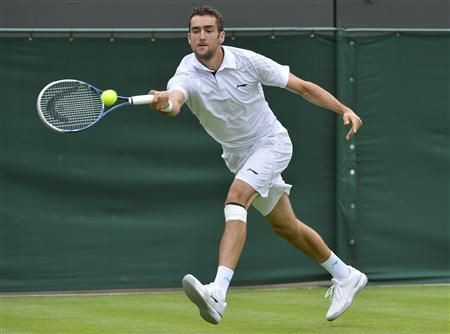Cilic Cited Injury At Wimbledon To Hide Failed Test

Marin Cilic cited a knee injury at Wimbledon this year to hide the fact he had failed a dope test, the International Tennis Federation (ITF) has revealed after handing the Croatian a nine-month suspension.
The former world number nine, banned last week after testing positive for the banned stimulant nikethamide, has said he never knowingly took any prohibited substance and plans to appeal to the Court of Arbitration for Sport.
The ITF, in a full decision of its independent anti-doping tribunal published on its website (www.itftennis.com), said the player was charged with a doping offence in a letter dated June 10 after a positive result in Munich on May 1.
Cilic received the letter on June 11 in London before his first match at the Queen's Club pre-Wimbledon tournament.
The Croat lost the final at Queen's to Andy Murray and, after instructing lawyers, played and won his first-round match at Wimbledon on June 24.
"On 26 June his lawyers in Brussels responded on his behalf, voluntarily accepting a provisional suspension until a decision in the case, and waiving his right to analysis of the B sample," the ITF decision said.
"He withdrew from Wimbledon, citing a knee injury to avoid adverse publicity."
A spokesman for the ITF said Cilic had been within his rights to cite an injury for his withdrawal from Wimbledon and that, under its own anti-doping rules, the ITF were not allowed to make the real reason public at the time.
The full findings of the case revealed that Cilic had asked his mother Koviljka to buy glucose powder from a pharmacy in Monte Carlo because he had run out of his usual supply which he took to help his body ingest the legal supplement creatine.
The tribunal heard that a leaflet inside the packet of Coramine glucose tablets she bought, printed in French, contained a warning that they could lead to a positive test.
"Anyone reading the side of the packet or the leaflet, even with only a very limited knowledge of French, would easily have identified the danger for an athlete with anti-doping responsibilities," the findings stated, adding that a quick internet search would have confirmed that Coramine is nikethamide and would result in a positive test.
However, it accepted that Cilic had inadvertently ingested nikethamide and "did not intend to enhance his performance in doing so".
The tribunal also heard that Cilic claimed to be under stress at the time of taking the tablets because his parents and his coach were not getting on well. The tribunal said the offence was "not at the most serious end of the scale" but still warranted a nine-month ban.
When Cilic withdrew from Wimbledon, on a day marked by a spate of injuries which raised concerns about the safety of the grasscourts, he was quoted as saying it was "a very black day".
(Reporting by Alan Baldwin and Martyn Herman; editing by Tony Jimenez and Toby Davis)
© Copyright IBTimes 2024. All rights reserved.





















